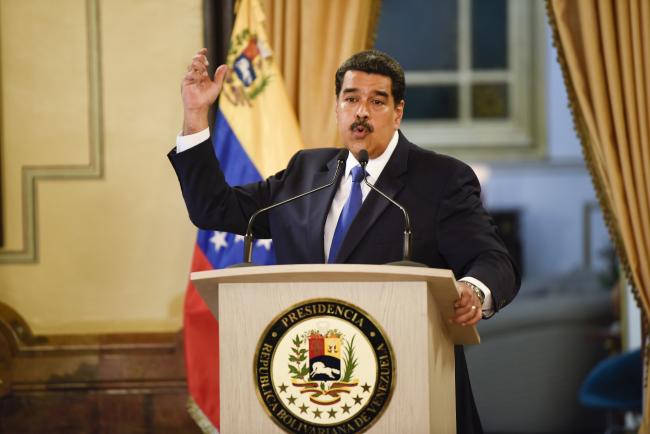(Bloomberg) -- The U.S. is seeking to loosen Nicolas Maduro’s grip on power in Venezuela by identifying accounts his regime could use to sell bonds and raise cash, according to six people familiar with the matter.
Treasury Department officials told investors that its ban on Venezuelan debt trading is in part designed to prevent sales that could benefit the authoritarian government, according to the people, who asked not to be identified because they weren’t authorized to discuss the matter. The restrictions are so sweeping because at this point Treasury can’t be sure which transactions might be providing money to the regime or high-ranking officials, they said.
A Treasury Department spokesperson declined to comment.
Venezuela observers have long suspected that billions of dollars of the country’s bonds, most issued years ago, are held in local accounts controlled by individuals connected to the administration or by state-owned entities like the central bank, Banco de Venezuela and the Economic and Social Development Bank. Such notes came under scrutiny in May 2017, when Goldman Sachs (NYSE:GS) Asset Management bought $2.8 billion of securities from the state oil company through a broker, providing cash to a financially strapped regime carrying out a deadly crackdown on street protests.
Treasury met with investors in Washington early last week to explain the scope of the sanctions and hear concerns, according to the people. The Financial Crimes Enforcement Network, or FinCEN, a part of the Treasury Department, is gathering data from banks on Maduro’s access to raise cash, another person familiar with the matter said. The government can gather information from U.S. financial institutions to thwart money laundering and financial crime under the Bank Secrecy Act’s know-your-customer provision.
Officials have been reviewing intermediary accounts from Miami to Panama City and the Cayman Islands to look for connections to suspect accounts, the people said. While there’s optimism recent sanctions that largely prohibit trading in Venezuelan debt have been effective in cutting off sales that could benefit the government, the ban would need to be re-evaluated if a political transition takes longer than expected, the people said.
The U.S. and dozens of other nations have backed National Assembly leader Juan Guaido as interim president, and officials sees cutting off funding as a critical component of pressuring Maduro to leave office peacefully.
As of last year, roughly $17 billion worth of the nation’s notes were in local accounts, according to New York-based brokerage firm Torino Capital. About $60 billion of Venezuelan bonds are in default.
“Is it a crime or illegal for public banks to sell their securities in the secondary market?” Simon Zerpa, Venezuela’s Finance Minister, said in an interview. “The question comes with the stain that we cannot seek resources to help the economy of our country work.”
Venezuela’s benchmark bonds suffered their worst week in more than a year last week as trading restrictions sapped demand for the defaulted debt. The $4 billion of government notes due in 2027 tumbled 3.7 cents to about 30 cents on the dollar, according to price quotes compiled by Bloomberg. Investors had bid up the debt earlier this year as Guaido and his allies gained momentum in their efforts to oust Maduro from power.
On Monday, the Treasury Department updated its measures on Venezuela. The latest guidelines clarify that U.S. broker dealers can help facilitate the sale of Venezuelan debt as part of any divestment to non-U.S. entities and that U.S. clearinghouses can act as custodians for the bonds, according to F. Amanda DeBusk, chair of Dechert’s international trade practice in Washington.
(Updates with new Treasury measures in 11th paragraph.)
